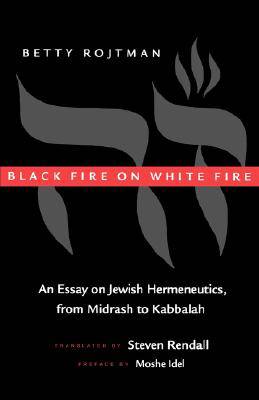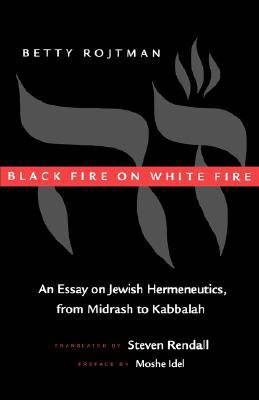
- Afhalen na 1 uur in een winkel met voorraad
- Gratis thuislevering in België vanaf € 30
- Ruim aanbod met 7 miljoen producten
- Afhalen na 1 uur in een winkel met voorraad
- Gratis thuislevering in België vanaf € 30
- Ruim aanbod met 7 miljoen producten
Zoeken
Black Fire on White Fire
An Essay on Jewish Hermeneutics, from Midrash to Kabbalah Volume 10
Betty Rojtman
€ 57,95
+ 115 punten
Omschrijving
Using the tools of contemporary semiotic theory to analyze classical rabbinic hermeneutics and medieval mystical exegesis, Betty Rojtman unveils a striking modernity in these early forms of textual interpretation. The metaphor from rabbinic literature that describes the writing of the Torah--black fire on white fire--becomes, in Rojtman's analysis, a figure for the differential structures that can be found throughout rabbinic discourse. Moving through the successive levels of traditional commentary, from early Midrash to modern Kabbalah, Rojtman examines the tension between the fluidity and nuance of the biblical text and the fixed commitment to ideological and theological content. To examine this strain between open text and sacred language, Rojtman scrutinizes the demonstrative, "this," as a word whose significance changes with every change in context. Her analysis suggests a double-layered meaning for "this," which refers to the existential world in its multiplicity but also to transcendence and the eternal presence of God.
Specificaties
Betrokkenen
- Auteur(s):
- Vertaler(s):
- Uitgeverij:
Inhoud
- Aantal bladzijden:
- 205
- Taal:
- Engels
- Reeks:
- Reeksnummer:
- nr. 10
Eigenschappen
- Productcode (EAN):
- 9780520203211
- Verschijningsdatum:
- 27/02/1998
- Uitvoering:
- Paperback
- Formaat:
- Trade paperback (VS)
- Afmetingen:
- 138 mm x 211 mm
- Gewicht:
- 272 g

Alleen bij Standaard Boekhandel
+ 115 punten op je klantenkaart van Standaard Boekhandel
Beoordelingen
We publiceren alleen reviews die voldoen aan de voorwaarden voor reviews. Bekijk onze voorwaarden voor reviews.











